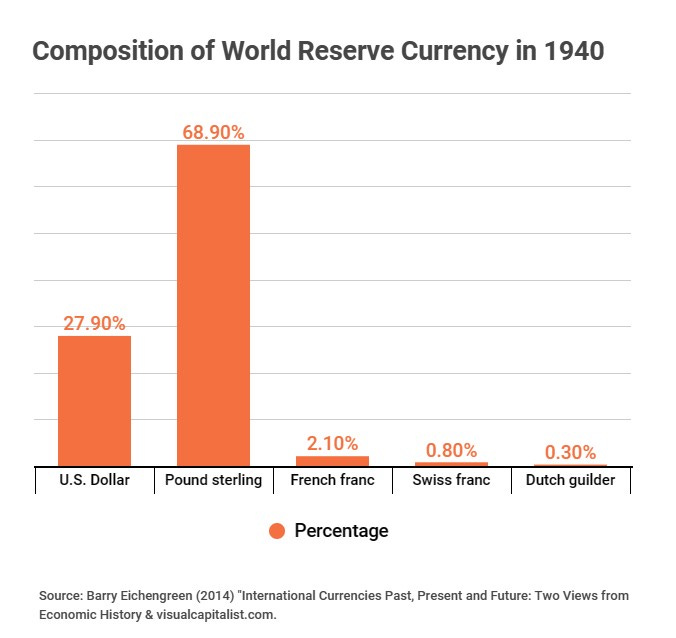History of Reserve Currency from 20th Century till Now.
Which currency was the most powerful in shaping the last century? and what's the most prominent currency now and what does future holds?
The history of reserve currency dating back 1800’s to now, can be divided into different stages or eras, reflecting the changing geopolitical and economic landscape of the world.
In the late 19th and early 20th century, the British pound sterling was the dominant reserve currency, accounting for about 62% of global reserves in 1900. The pound was backed by gold and silver and widely used in international trade and finance.
The classical gold standard era (1870-1914): During this period, most countries adopted the gold standard, which meant that they fixed the value of their currency to a certain amount of gold. This facilitated international trade and payments, as exchange rates were stable and predictable. The British pound sterling was the dominant reserve currency, as Britain was the leading economic and financial power of the world.
After World War I, the U.S. dollar emerged as a rival to the pound, as the U.S. became a major creditor and exporter nation. The dollar was also backed by gold under the Bretton Woods system, which fixed exchange rates among major currencies. By 1920, the dollar had a 28.4% share of global reserves.
During World War II, the U.S. became the main supplier of goods and services to the Allied powers, while Britain incurred huge debts. The dollar's role as a reserve currency was further strengthened by the creation of the **Federal Reserve** in 1913, which issued Federal Reserve notes as a form of elastic currency. By 1940, the dollar had a 27.9% share of global reserves, while the pound had 68.9%.
After World War II, the Bretton Woods system was established to promote international monetary cooperation and stability. The dollar was pegged to gold at $35 per ounce, while other currencies were pegged to the dollar. The dollar became the de facto reserve currency of the world, as it was widely used in trade and financial transactions. By 1960, the dollar had a 61.7% share of global reserves, while the pound had 35.1%
Post Bretton Woods, In the late 1960s and early 1970s, the Bretton Woods system collapsed due to various factors, such as inflation, balance of payments deficits, and political turmoil. The U.S. suspended the convertibility of the dollar to gold in 1971, ending the gold standard. The world entered a period of floating exchange rates, where currencies fluctuated according to market forces. The dollar remained the dominant reserve currency, but its share declined to 57.9% by 1980.
In the 1980s and 1990s, two new reserve currencies emerged: the Deutsche mark and the Japanese yen. Both countries had strong export-oriented economies and accumulated large foreign exchange reserves. The Deutsche mark was seen as a stable and reliable currency in Europe, while the yen was boosted by Japan's economic miracle and financial liberalization. By 1990, the Deutsche mark had a 12.9% share of global reserves, while the yen had a 9.4% share.
In 1999, the euro was introduced as a common currency for 11 European countries (later expanded to 19). The euro was intended to enhance economic integration and competitiveness in Europe, as well as to challenge the dollar's dominance. The euro quickly gained popularity as a reserve currency, reaching a peak of 28% of global reserves by 2009.
In the 21st century, the dollar has faced several challenges as a reserve currency, such as the global financial crisis of 2008-2009, the U.S.-China trade war, and the COVID-19 pandemic. However, it has also shown resilience and adaptability, benefiting from its network effects, liquidity, and safe-haven status. As of 2020, the dollar still accounted for nearly 60% of global reserves.
Sources:
Here's How Reserve Currencies Have Evolved Over 120 Years (visualcapitalist.com)
How the U.S. Dollar Became the World's Reserve Currency (investopedia.com)
World Reserve Currency History Chart | American Bullion
World Reserve Currencies: What Happened During Previous Periods Of Transition? | Seeking Alpha









